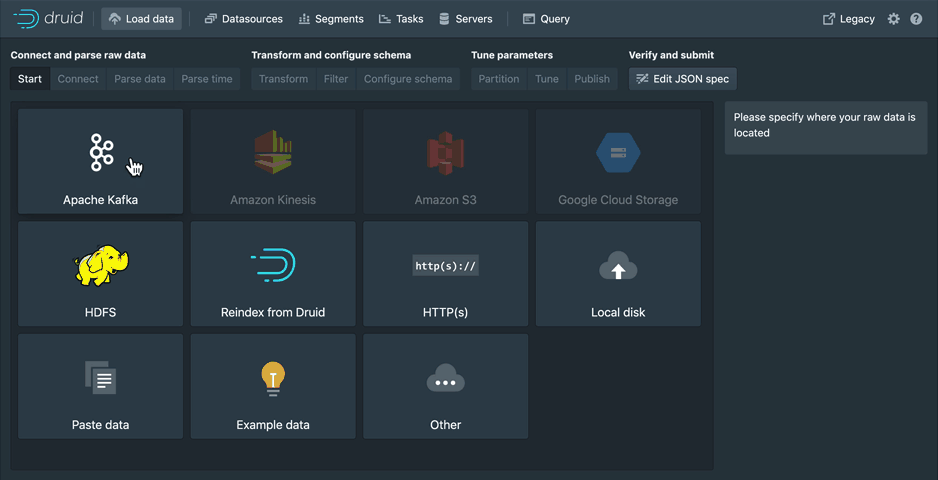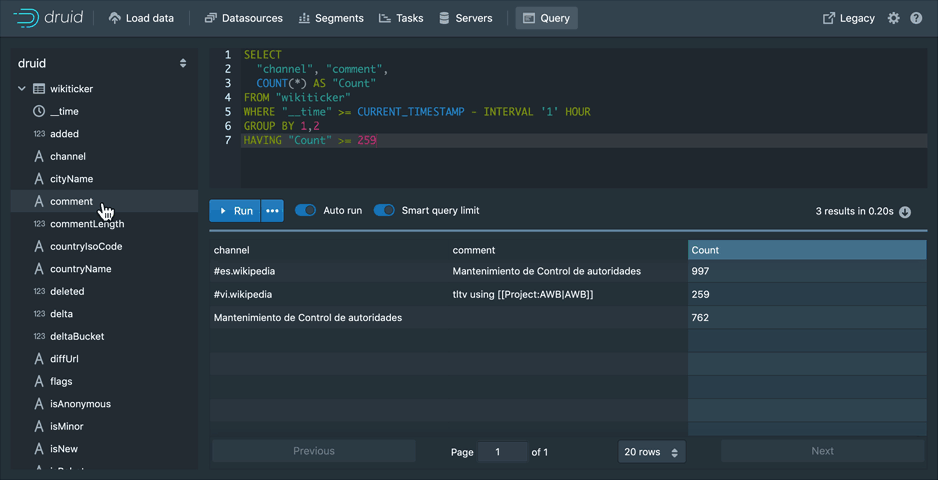changes: * modified druid schema column type compution to special case COMPLEX<json> handling to choose COMPLEX<json> if any column in any segment is COMPLEX<json> * NestedFieldVirtualColumn can now work correctly on any type of column, returning either a column selector if a root path, or nil selector if not * fixed a random bug with NilVectorSelector when using a vector size larger than the default and druid.generic.useDefaultValueForNull=false would have the nulls vector set to all false instead of true * fixed an overly aggressive check in ExprEval.ofType when handling complex types which would try to treat any string as base64 without gracefully falling back if it was not in fact base64 encoded, along with special handling for complex<json> * added ExpressionVectorSelectors.castValueSelectorToObject and ExpressionVectorSelectors.castObjectSelectorToNumeric as convience methods to cast vector selectors using cast expressions without the trouble of constructing an expression. the polymorphic nature of the non-vectorized engine (and significantly larger overhead of non-vectorized expression processing) made adding similar methods for non-vectorized selectors less attractive and so have not been added at this time * fix inconsistency between nested column indexer and serializer in handling values (coerce non primitive and non arrays of primitives using asString) * ExprEval best effort mode now handles byte[] as string * added test for ExprEval.bestEffortOf, and add missing conversion cases that tests uncovered * more tests more better
Website | Twitter | Download | Get Started | Documentation | Community | Build | Contribute | License
Apache Druid
Druid is a high performance real-time analytics database. Druid's main value add is to reduce time to insight and action.
Druid is designed for workflows where fast queries and ingest really matter. Druid excels at powering UIs, running operational (ad-hoc) queries, or handling high concurrency. Consider Druid as an open source alternative to data warehouses for a variety of use cases. The design documentation explains the key concepts.
Getting started
You can get started with Druid with our local or Docker quickstart.
Druid provides a rich set of APIs (via HTTP and JDBC) for loading, managing, and querying your data. You can also interact with Druid via the built-in web console (shown below).
Load data
Load streaming and batch data using a point-and-click wizard to guide you through ingestion setup. Monitor one off tasks and ingestion supervisors.
Manage the cluster
Manage your cluster with ease. Get a view of your datasources, segments, ingestion tasks, and services from one convenient location. All powered by SQL systems tables, allowing you to see the underlying query for each view.
Issue queries
Use the built-in query workbench to prototype DruidSQL and native queries or connect one of the many tools that help you make the most out of Druid.
Documentation
See the latest documentation for the documentation for the current official release. If you need information on a previous release, you can browse previous releases documentation.
Make documentation and tutorials updates in /docs using MarkDown and contribute them using a pull request.
Community
Visit the official project community page to read about getting involved in contributing to Apache Druid, and how we help one another use and operate Druid.
- Druid users can find help in the
druid-usermailing list on Google Groups, and have more technical conversations in#troubleshootingon Slack. - Druid development discussions take place in the
druid-devmailing list (dev@druid.apache.org). Subscribe by emailing dev-subscribe@druid.apache.org. For live conversations, join the#devchannel on Slack.
Check out the official community page for details of how to join the community Slack channels.
Find articles written by community members and a calendar of upcoming events on the project site - contribute your own events and articles by submitting a PR in the apache/druid-website-src repository.
Building from source
Please note that JDK 8 or JDK 11 is required to build Druid.
See the latest build guide for instructions on building Apache Druid from source.
Contributing
Please follow the community guidelines for contributing.
For instructions on setting up IntelliJ dev/intellij-setup.md






